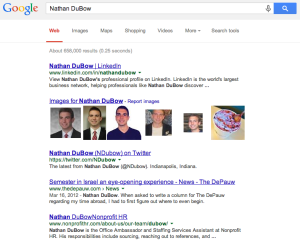WTOP: 5 ways nonprofits can…
New Year’s resolutions are famously unrealistic and it is common for people to make the same resolution year after year hoping that this year something will go differently and they will be successful. As the US continues slowly to climb back from the economic downturn, I expect that many Americans will resolve to get back to work in 2014. USA Today stated this week that “while the ‘official’ unemployment rate has fallen steadily since the summer of 2009, the improvement in the data has come largely from the ongoing wave of jobless people who have given up looking for work.” Unfortunately, simply resolving to find a job this year is not going to make that dream come true. Instead, I have laid out 3 realistic resolutions with steps you can follow to point your job-search in the right direction and hopefully meet success in 2014.
Get a Digital Facelift

Network ‘til you Drop
If there is anything worthwhile to spend money on, even when unemployed, it is networking. Luckily, there are many opportunities to network that are free or low-cost. Resolve to make new connections in 2014. Networking is essential to any job-search. Online, LinkedIn is an easy way to begin developing your professional network. Unfortunately, online networking will only get you so far. You need to get yourself in front of people. Communicate with friends, past co-workers, and peers to identify connections they have in organizations that you are interested in working for. Use sites like MeetUp.com to identify people near you working in your field or interested in similar activities. Join a networking group like the Young Nonprofit Professionals Network to meet people and take advantage of professional development opportunities. If you have the resources, take the opportunity to attend a conference in your field. Conferences give you the opportunity to network and develop your skills at the same time.
Improve Yourself
You should always strive to improve your understanding of the world around you, regardless of your career path. Resolve to develop yourself professionally. Take the opportunity while you have time on your hands to pursue education. This may mean learning a new skill, like coding, or refining and updating your existing skill set in your field. Nonprofits rely on employees with diverse skills to fill staffing gaps, so you will make yourself a more attractive candidate if you bring that something extra to the table. Additionally, dedication to continued learning will reflect positively upon you and make you more marketable to employers. Many networking groups, nonprofit organizations, and community colleges offer adult learning, continuing education, and professional development opportunities for free or very low costs.
If you are interested in learning more about how Nonprofit HR can help you attain career success this year, contact us.



























